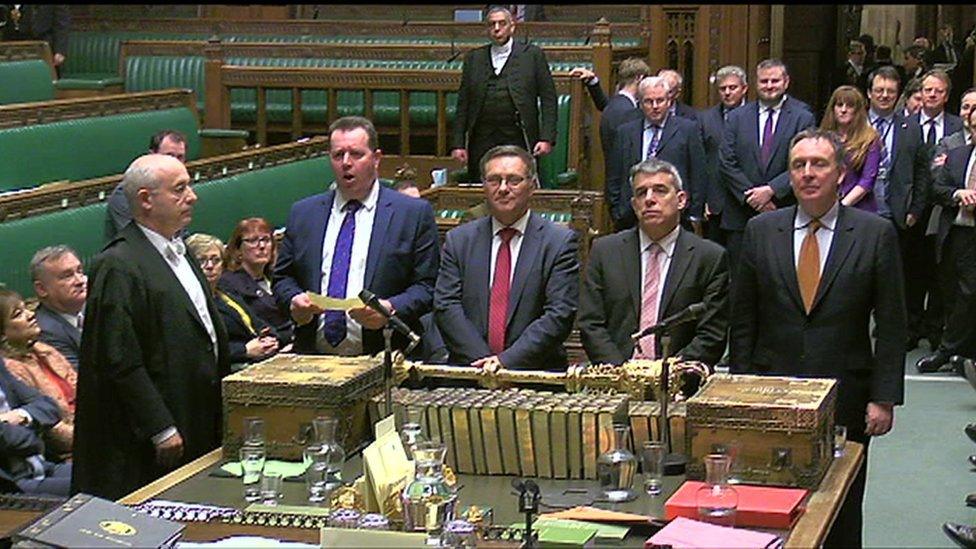The Brexit Bill: (almost) nothing has changed (yet)
- Published
- comments

MPs hold their final vote - for now - on the European Union (Withdrawal) Bill
Well that was 85 hours of detailed parliamentary scrutiny/your life that you won't get back* (delete as appropriate).
The European Union (Withdrawal) Bill has now completed its journey through the House of Commons. More than 500 amendments were tabled and, according to Government Chief Whip Julian Smith, there were 58 divisions, only one of which (on Parliament having a "meaningful vote") was lost by the government.
Along the way, various attempts to amend the bill to the liking of the Welsh and Scottish governments failed. The Welsh first minister's warning of "an assault on devolution" and a "power grab" could not prevent Theresa May winning Tuesday's vote on the issue by a majority of 24, helped by three Eurosceptic Labour MPs who voted with the Conservative government.
Labour's ambiguity on Britain's future relationship with the EU has survived the Bill's parliamentary journey so far. Jeremy Corbyn's view that "the single market is dependent on membership of the European Union", external is not shared by all his MPs. Almost 50 Labour MPs ignored instructions to abstain on a cross-party vote on single market membership , external- among them Welsh backbenchers Chris Bryant, Ann Clwyd, Geraint Davies, Stephen Doughty, Susan Elan Jones, Madeleine Moon, Albert Owen and Jo Stevens.
'Crisis'
Tuesday also saw the first warning this year of a "constitutional crisis", from Labour's Anna McMorrin, external. Failing to gain the consent of the Welsh and Scottish governments would be a political setback but it would not be insurmountable for Theresa May. But then constitutional crises are in the eye of the beholder - some might think that Northern Ireland not having had a government for a year qualifies.
The most influential opposition to the government over the Bill's impact on devolution appears to be coming from the Scottish Conservatives. Their leader, Ruth Davidson, made her views clear last week. In the Commons, Stirling Tory MP Stephen Kerr was disappointed that the government had not brought forward promised amendments designed to tackle the concerns of the devolved governments.
"I make no bones about it," said Mr Kerr. "It sticks in my craw to think that unelected Lords will make the vital amendments to this vital constitutional Bill. It is not really good enough, and as a member of the House of Commons I hang my head to think that we have somehow dropped the ball. The Bill will leave this House unamended and in an unsatisfactory state, and we are now dependent on unelected Lords to do our job for us."
Ah yes, the Lords, or "Lords?.." as the chief whip put it. With no government majority there, he knows the Bill will face a far bumpier ride there, with ministers under pressure to come up with amendments on devolution that satisfy the governments in Wales, which voted to leave the EU, and in Scotland, which voted to remain in the EU.
Anna McMorrin's warning of a "constitutional crisis" is unlikely to be the last of 2018.